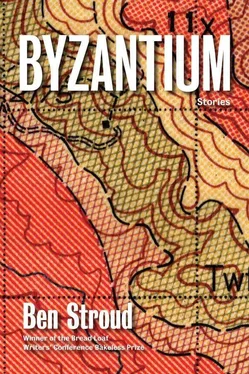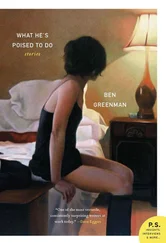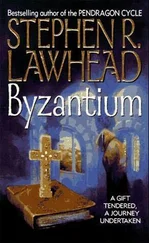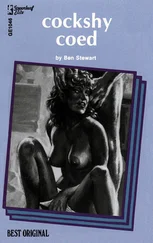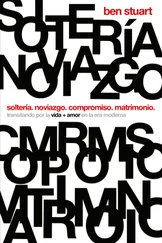When Burke returned to his rooms from his morning visit to the sea baths, Fernandita, his maid, was shaking the bugs out of his mosquito net. He lived in cramped quarters, on the second floor of an old mansion between the wharves and the post office. The mansion’s ground floor was given over to a molasses warehouse, and its top floors had been cut into apartments. Burke occupied one of these, an old bedchamber in the back of the building that was partitioned into three rooms and looked over the harbor. One room served as his bedroom, its neighbor as his small study and parlor, and the third room, barely a closet, was Fernandita’s.
“Your food is on the desk,” Fernandita said, giving the net one more vigorous shake before sweeping the loosed mosquitoes and other insects onto a scrap of newspaper. A skinny, toothless, yellow-skinned woman past middle age, Fernandita was Burke’s only companion in the city.
Inspecting his breakfast, Burke picked a green beetle from his eggs and tossed it into the grate, where Fernandita had lit a small flame, then he sat and ate as he read again the letter he’d received from Don Hernán Vargas y Lombilla. My business is most delicate, Don Hernán had written, giving no further clue to the nature of his problem. Burke hoped for a challenge, and let his mind wander once more, imagining all the possible conundrums the don might present him.
He was at the start of his life, twenty-two, a free gentleman of color who had left his home in the lower Brazos not a year before. His mother had been a slave, his father a Texas sugar planter. Burke had come to Havana after his father died, freeing him, as he thought that here he might make use of his Spanish and his knowledge of the sugar business. But his various inquiries at those trading houses open to negroes met only with vague promises of later openings, and within four months he was down to his last pennies. It was then he’d read an account of a mystery baffling the city: a nun in the Convent of Santa Clarita had been poisoned, yet she seemed to have no enemies and the walls of the convent were most secure. Puzzling over the story and the details of the nun’s life, Burke had soon figured out how it must have been done. The dentist who visited the convent had mixed her toothpowder with arsenic. Burke wrote the captain-general with the solution, and the dentist, taken by the police, confessed to the crime. Unbeknownst to the nun, she had been named in the will of a wealthy coffee grower, an uncle, and were she to die the legacy was to pass to a distant cousin — the man who’d bribed the dentist.
At a loss for income and facing mounting debts, Burke had seen then how he might support himself. After the Case of the Poisoned Toothpowder he was approached with another, and soon Habaneros burdened with seemingly insoluble problems were calling on him in his rooms at least once a week. He took each case offered him, stringing together enough money to pay his creditors as he swiftly established a reputation for uncommon subtlety and skill.
AFTER HE FINISHED HIS BREAKFAST, Burke was fetched by one of the don’s volantas. It was driven by a negro postilion and fitted out with soft leather seats, a Turkish rug, and, lodged in a teak case, a brass lorgnette for observing passengers in other carriages. As he rode, Burke tried the lorgnette but, feeling foolish, soon put it away and sat for the rest of the trip with his hands in his lap. Within twenty-five minutes he was delivered to a sprawling estate near the top of the Jesús del Monte. The postilion stopped at the front door, and Burke alighted and was immediately led by another negro down a marble-floored hallway, into a courtyard with a tinkling fountain encircled by orange trees, and then into the don’s office, where gilt-framed ancestors stared down from the walls and old account ledgers filled the bookshelves. For fifteen minutes Burke sat alone. Then, at ten precisely, the don strode into the room. Burke had worn his dark coat, white waistcoat, and white drill trousers, the uniform Havana fashion demanded of its gentlemen, but Don Hernán, a stout man with gray, slicked hair and a waxed imperial, was in his silk dressing gown. He snapped at the liveried slave, who then stepped forward and presented two plates piled with eggs and the plump red sausages they’d lately begun selling in the markets. “French sausages” they were called — a bid, Burke suspected, to justify their expense.
“No, thank you, I’m quite full,” Burke said, refusing his plate with an apologetic smile. The don snapped again at the slave, and the slave transferred Burke’s servings to the don’s plate.
Don Hernán did not speak as he ate, and Burke remained silent. He watched as the don cut each sausage into three pieces and shoved the pieces into his mouth, grease dribbling into his imperial. Now that he was here, Burke was nervous about the meeting. One of the island’s wealthiest sugar planters, Don Hernán held more sway in Havana than any other creole and could, with a single whisper, ruin Burke’s career before it had even begun. A man in his sixties who looked younger than his years — he was childless and a carouser — he was known to be fickle and demanding. Whatever the don’s request, Burke couldn’t afford to fail him.
When the don finished eating, he shoved the plate away, dabbed at his lips, then lit a cigar. Once he had the cigar going, he eased back in his chair. “A month ago,” he said, “the manager of my Santo Cristo estate sent up a load of fruit along with two slaves to work in the house. The next day the mules, still bearing the fruit, were found grazing in a field off the Infanta highway, three miles outside the city. The two slaves were gone without a trace.”
The don paused. Burke held himself erect in his seat, but unease rippled through him. So far he’d avoided any cases that touched on slaves.
“That was a month ago. A week ago I lost my treasure, my Marcita.” The don fumbled in the pocket of his gown and pulled out a gilt-framed daguerreotype and passed it to Burke. “My cinnamon,” the don said. “She is most precious to me.”
As Burke examined the photograph, his palms sweated a little. A mulatta in a muslin dress, her hair curled and tied with ribbons, stared out from the photographer’s painted landscape — a wooded hill, a distant temple. Her face was soft-featured, her eyes heavy-lidded, her mouth drawn into a coquette’s half smile. Her skin, from the picture’s tint, indeed seemed a bronze, cinnamon hue. Burke gave the picture back to the don, who returned it to his pocket.
“I’m not the only one with losses. It has been the talk of the Planters’ Club for weeks. Don Sancho is missing four slaves, Don Nicasio is missing five. And these just from the city. It seems to be the season of runaways.” He took a puff of his cigar, let out the smoke. “I have put her description in the papers with the offer of a reward, and I’ve had two of the city’s best slave hunters watching for her. All for nothing. So now I try you.” He put his hand on his desk and leaned forward. “I want you to find Marcita. It is hard, without my cinnamon here to comb my hair and soothe me.” In that moment, the man seemed truly distraught.
In Burke’s mind, a vision of himself stood, bowed stiffly, and pronounced that on his conscience he must refuse. But Don Hernán could ruin him. He hesitated as long as he could, his thoughts a fog. Then Don Hernán coughed impatiently and Burke lowered his eyes and said, “I am at your service.”
AFTER HE AGREED TO TAKE THE CASE, a cold dizziness bloomed beneath Burke’s chest. He fought it as best he could with procedure. In questioning the don and several of the other slaves, Burke learned that Marcita had disappeared in the Calle O’Reilly while marketing in the company of two slave boys, Domingo and Miércoles. They were out on an errand, so Burke arranged to have the boys meet him in the city at five. Then he made an inspection of Marcita’s quarters. She lived in a small room near the kitchens. One wall was decorated with an advertisement for an Italian soprano who had appeared on the stage two years before, and another with a collection of Honradez cigarette labels from a series depicting the progress of a pollo, a fop, from prince of the ball to beggar. Another series of labels, these for a Villargas brand, lay on her bedside table. They showed each of the islands of the Antilles as ladies, Cuba regal and bedecked with pearls and tobacco leaves, sprinkling sugar onto a globe, Santo Domingo a weeping negress with torn skirts. In a plain earthen jar Burke found a bundle of feathers and dried leaves, of the kind you could buy from the guinea women in the night markets for good luck, and beneath a loose tile he discovered a burlap sack filled with coins. He paused over this last item, wondering what might have compelled Marcita to forget the sack when she ran. Perhaps it meant she had fled on impulse. Then he left, sitting once more in the don’s high-wheeled carriage, his observations pressed against the front of his mind to stanch any seepings of guilt.
Читать дальше
